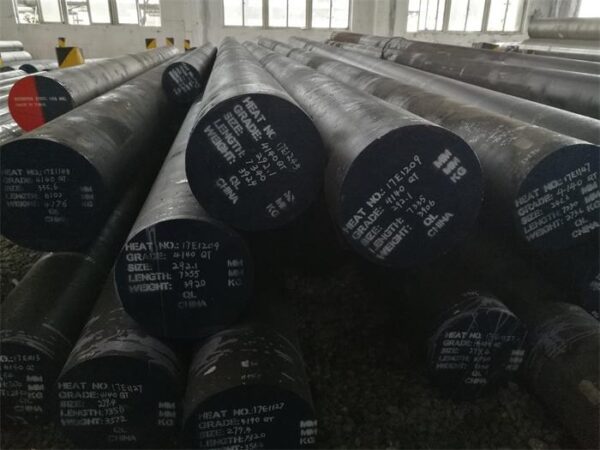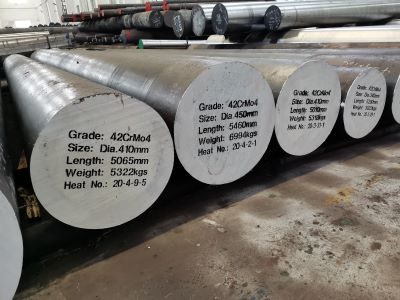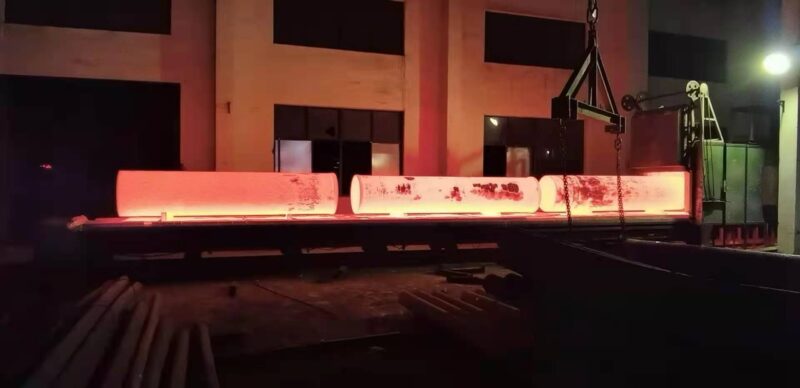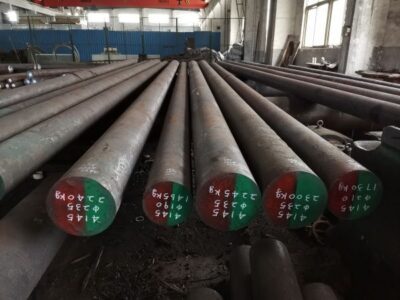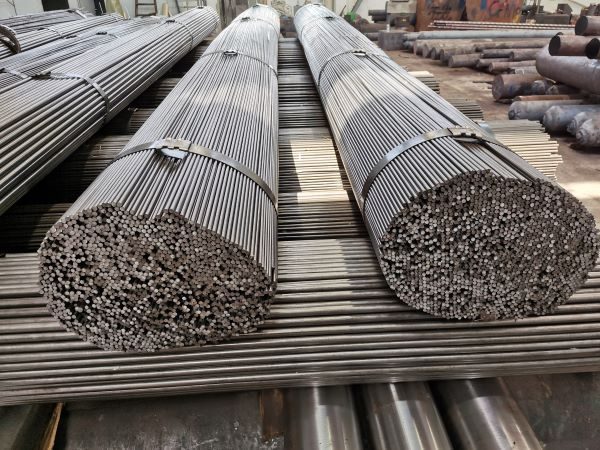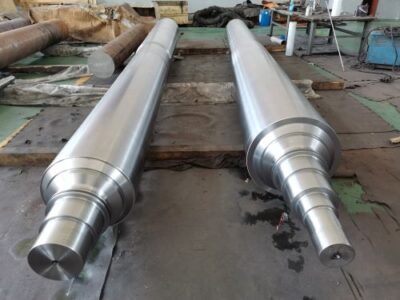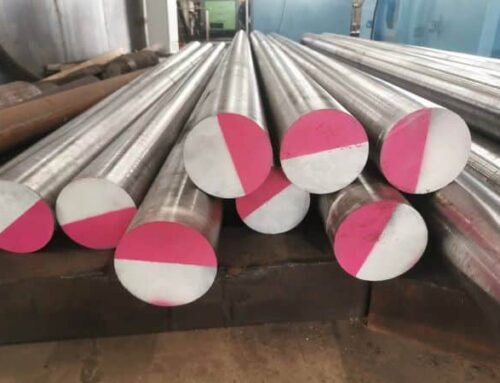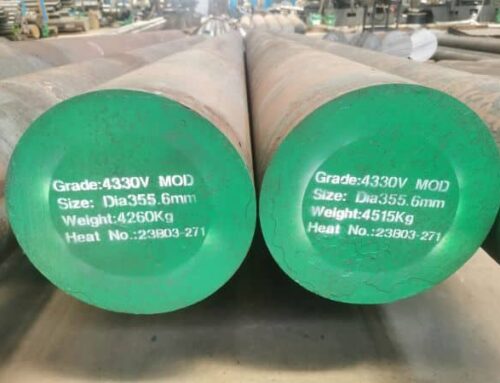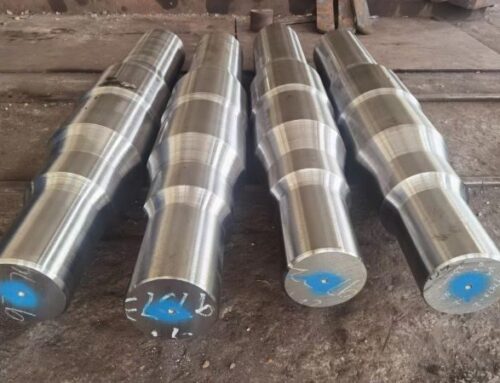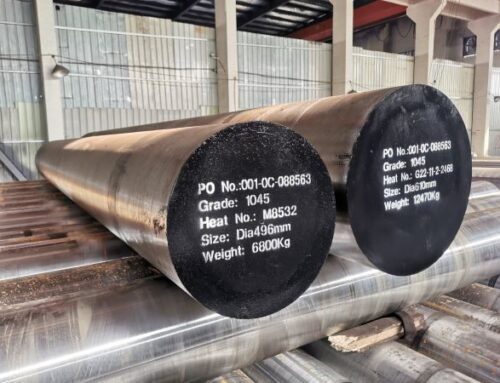AISI 4140 steel Manufacturer and Exporter,supplied with round,square,flat,block,and shaft etc.AISI 4140 is defined as a low alloy steel which has 1% Cr-Mo as strengthening alloy elements.Compared with AISI 4130, it has a higher carbon content with good balance of strength, toughness ,abrasion and impact resistance and heat treatment capabilities,but poor in weldability characteristics.AISI 4140 is generally supplied in quenched and tempered condition with hardness 28-32HRC.
1.Supply Form & Size & Tolerance
| Supply Form | Size(mm) | Process | Tolerance | |
Round | Φ6-Φ100 | Cold Drawn | Bright/Black | Best H11 |
Φ16-Φ350 | Hot Rolled | Black | -0/+1mm | |
| Peeled/ground | Best H11 | |||
Φ90-Φ1000 | Hot Forged | Black | -0/+5mm | |
| Rough Turned | -0/+3mm | |||
Flat/Square/Block | Thickness :120-800 | Hot Forged | Black | -0/+8mm |
| Width:120-1500 | Rough Machined | -0/+3mm | ||
Remark:Tolerance can be customized as per requests
2.Chemical Composition
| Standard | Grade | C | Si | Mn | P | S | Cr | Ni | Mo |
| ASTM A29 | 4140 | 0.38-0.43 | 0.15-0.35 | 0.75-1.00 | ≤ 0.035 | ≤ 0.04 | 0.8-1.1 | – | 0.15-0.25 |
EN10083 | 42CrMo4 | 0.38-0.45 | ≤ 0.4 | 0.6-0.90 | ≤ 0.025 | ≤ 0.035 | 0.9-1.2 | – | 0.15-0.30 |
| 1.7225 | |||||||||
| JIS G4105 | SCM440 | 0.38-0.43 | 0.15-0.35 | 0.6-0.85 | ≤ 0.035 | ≤ 0.04 | 0.9-1.2 | – | 0.15-0.30 |
| GB 3077 | 42CrMo | 0.38-0.45 | 0.17-0.37 | 0.5-0.80 | ≤ 0.035 | ≤ 0.035 | 0.9-1.2 | – | 0.15-0.25 |
| BS 970 | EN19 | 0.35-0.45 | 0.15-0.35 | 0.5-0.80 | ≤ 0.035 | ≤ 0.035 | 0.9-1.5 | – | 0.2-0.40 |
3.Physical Property
| Density g/cm3 | 7.85 | ||||
| Melting point °C | 1416 | ||||
| Poisson's ratio | 0.27-0.30 | ||||
| Machinability (AISI 1212 as 100% machinability) | 65% | ||||
| Thermal expansion co-efficient µm/m°C | 12.2 | ||||
| Thermal conductivity W/(m.K) | 46 | ||||
| Modulus of elasticity 10^3 N/mm2 | 210 | ||||
| Electric resistivity Ohm.mm2 /m | 0.19 | ||||
| Specific heat capacity J/(kg.K) | 460 | ||||
Modulus of elasticity 10^3 N/mm2 | 100 ℃ | 200 ℃ | 300 ℃ | 400 ℃ | 500 ℃ |
| 205 | 195 | 185 | 175 | 165 | |
Thermal expansion 10^6 m/(m.K) | 100 ℃ | 200 ℃ | 300 ℃ | 400 ℃ | 500 ℃ |
| 11.1 | 12.1 | 12.9 | 13.5 | 13.9 | |
4. Mechanical Property
| Mechanical Condition | R | S | S | T | U | V | W |
| Ruling Section mm | 250 | 250 | 150 | 100 | 63 | 30 | 20 |
| Tensile Strength Mpa | 700-850 | 770-930 | 770-930 | 850-1000 | 930-1080 | 1000-1150 | 1080-1230 |
| Yield Strength Mpa Min | 480 | 540 | 570 | 655 | 740 | 835 | 925 |
| Elongation % | 15 | 13 | 15 | 13 | 12 | 12 | 12 |
| Izod Impact J Min | 34 | 27 | 54 | 54 | 47 | 47 | 40 |
| Charpy Impact J Min | 28 | 22 | 50 | 50 | 42 | 42 | 35 |
| Hardness Brinell HB | 201-255 | 233-277 | 233-277 | 248-302 | 269-331 | 293-352 | 311-375 |
5.High Temperature Strength
| For quenched and tempered heavy forgings | |||||||
Diameter mm | Yield strength MPa | ||||||
| 20 ℃ | 100 ℃ | 200 ℃ | 250 ℃ | 300 ℃ | 350℃ | 400℃ | |
| ≤250 | 510 | 486 | 461 | 441 | 422 | 392 | 363 |
| 250-500 | 460 | 431 | 412 | 402 | 382 | 353 | 324 |
| 500-750 | 390 | 333 | 333 | 324 | 304 | 275 | 245 |
6.Forging
Forging temperature should be carried out between 900℃-1200℃,The lower the forging-ending temperature ,the finer the grain size .Hold the temperature till uniform before forge,minimum forging temperature 850°C,so don’t forge below 850℃.AISI 4140 steel should be cooled as slowly as possible in still air or in sand after forged.
7.Normalizing
Normalizing is used to refine the structure of forgings that might have cooled non-uniformly after forged,and considered as a conditioning treatment before final heat treatment.Normalizing temperature for AISI 4140 steel should be carried out between 870℃-900℃. hold suitable time for the steel to be thoroughly heated to complete the ferrite to austenite transformation.Cool in still air.
8.Annealing
After Forged,AISI 4140 steel may be annealed .Annealing temperature should be carried out between 800℃-850℃, hold suitable time for the steel to be thoroughly heated. Cool slowly in the furnace.This treatment will form a structure suitable for machining.The maximum Hardness is 241 HB.
9.Hardening
This heat treatment will obtain martensite structure after quenched.It should be carried out between 840℃-875℃, hold suitable time for the steel to be thoroughly heated, soak for 10-15 minutes per 25 mm section, and quench in oil, water, or polymer as required.Tempering should be followed immediately after quenched.
10.Tempering
Tempering is usually carried out to relieve stresses from the hardening process, but primarily to obtain the required hardness and mechanical properties. The actual tempering temperature will be chosen to meet the required properties.Heat the AISI 4140 carefully to a suitable temperature ,usually between 550℃-700℃, soak at the temperature for 2 hours per 25mm of ruling section, then cool in air.Tempering between 250℃-375℃ is not avoided as tempering within this range will seriously reduce the impact value,result in temper brittleness .
11.Application
AISI 4140 steel finds many applications as forgings for the aerospace,oil and gas,automotive, agricultural and defense industries etc.
Typical applications for 4140 steel uses include:forged gears,spindles,fixtures,jigs,collars,Axles,conveyor parts,crow bars,logging parts,shafts,sprockets,studs,pinions,pump shafts, rams, and ring gears etc
AISI 4140 STEEL BUYING GUIDE
Are you in the market to buy AISI 4140 steel but you’re not sure of the reasons why you need it? If yes, here now we have prepared a comprehensive guide that will give you an overview of its properties, composition, applications, and much more.
4140 steel is known for its versatility and strength. Read our expert guide to get more insights on AISI 4140 steel. Following are the queries that you might have in your mind regarding the 4140 steel before buying.
By the end of this guide, you’ll not only be skilled to look at and distinguish 4140 steel, you will also have the knowledge in finding the best source for it.
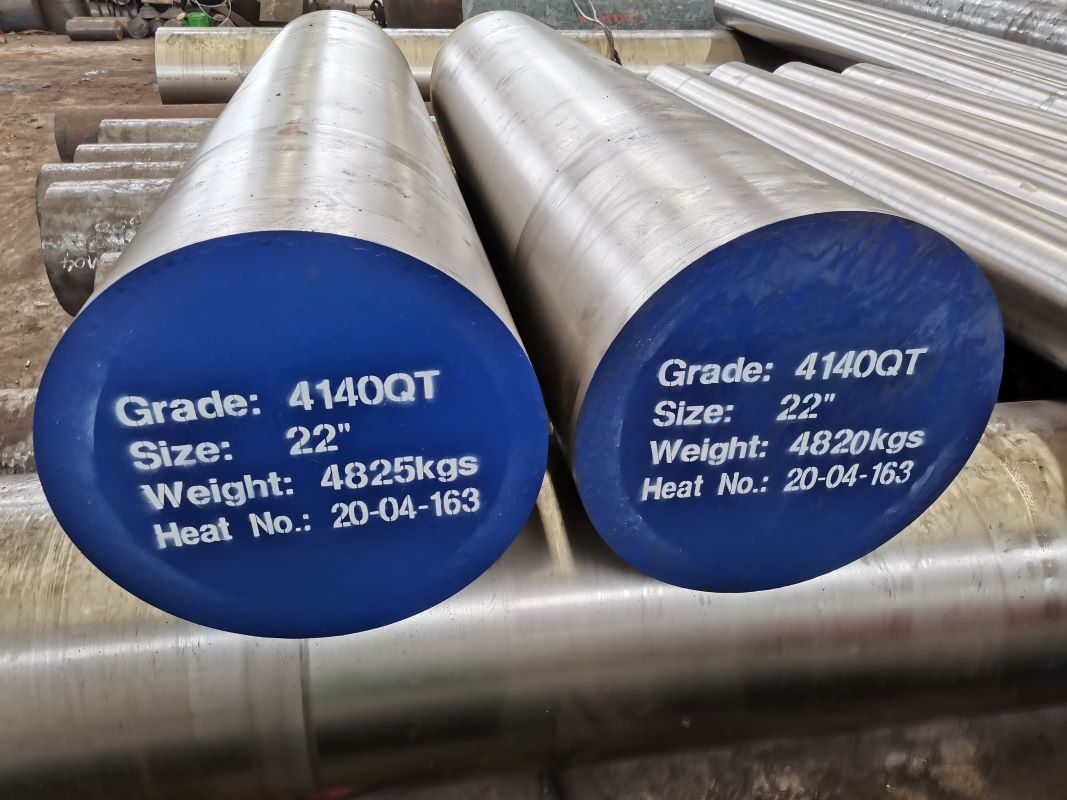
WHAT IS AISI 4140 STEEL GRADE DESIGNATION?
To understand the AISI 4140 steel properties, it is important to understand what the grade numbers in it mean. Following is the AISI 4140 steel grade designation:
4: The first number ‘4’ indicates that the steel is ‘Molybdenum’ steel and Molybdenum is most important alloy element for this steel as compared to other steel series. For example the steel series
1XXX: Carbon steel
5XXX: Chromium steel
1: The second number ‘1’ indicates that this steel has Chromium element as the secondary alloy.For example the steel series as below
40XX: Mo 0.20-0.25%
44XX: Mo 0.40-0.52%
41XX: Cr 0.50-0.95%, Mo 0.12-0.30%
40: The last two numbers ‘40’ indicates the amount of carbon present in the steel. For this grade it has 0.40% carbon compared with AISI 4130 steel which has 0.30% carbon.
WHAT ARE EQUIVALENT GRADES FOR AISI 4140 STEEL?
We can see the international equivalent grades as below.Compared with AISI 4140 Steel,each country adjust chemical composition to meet their actual requirement.It is also a good way to replace the material with similar grade.
| Standard | Grade | C | Si | Mn | P | S | Cr | Ni | Mo |
| ASTM A29 | 4140 | 0.38-0.43 | 0.15-0.35 | 0.75-1.00 | ≤ 0.035 | ≤ 0.04 | 0.8-1.1 | – | 0.15-0.25 |
EN10083 | 42CrMo4 | 0.38-0.45 | ≤ 0.4 | 0.6-0.90 | ≤ 0.025 | ≤ 0.035 | 0.9-1.2 | – | 0.15-0.30 |
| 1.7225 | |||||||||
| JIS G4105 | SCM440 | 0.38-0.43 | 0.15-0.35 | 0.6-0.85 | ≤ 0.035 | ≤ 0.04 | 0.9-1.2 | – | 0.15-0.30 |
| GB 3077 | 42CrMo | 0.38-0.45 | 0.17-0.37 | 0.5-0.80 | ≤ 0.035 | ≤ 0.035 | 0.9-1.2 | – | 0.15-0.25 |
| BS 970 | EN19 | 0.35-0.45 | 0.15-0.35 | 0.5-0.80 | ≤ 0.035 | ≤ 0.035 | 0.9-1.5 | – | 0.2-0.40 |
For Further Disscussion:
CAN WE USE AISI 4140 STEEL INSTEAD OF 42CrMo4 STEEL?
42CrMo4 is European grade from EN10083 standard,while AISI 4140 is American grade from ASTM A29 standard,they are internatioal eqnivalent grade,and have similar chemical chemical compositon.So we can adjust the amount of alloy element in below table when we prodcue them.
Chemical Composition Adjustment for 4140 and 42CrMo4
| 4140 | 42CrMo4 | Adjustment for 4140 and 42CrMo4 |
| C:0.38-0.43% | C:0.38-0.45% | C:0.38-0.43% |
| Si:0.15-0.35% | Si:≤ 0.4% | Si:0.15-0.35% |
| Mn:0.75-1.0% | Mn:0.6-0.9% | Mn:0.75-0.9% |
| Cr:0.8-1.1% | Cr:0.9-1.2% | Cr:0.9-1.1% |
| Mo:0.15-0.25% | Mo:0.15-0.30% | Mo:0.15-0.25% |
42CrMo4 Steel Round Bar
WHAT IS THE DIFFERENCE BETWEEN AISI 4140 STEEL AND AISI 4130 STEEL?
From the AISI designation rules,First we know that 4140 has 0.4% percent carbon(0.38-0.43%) compared with 4130 which has lower o.3% carbon(0.28-0.33%).And also the Manganese is totally different,0.75-1.0% from 4140 compared with 0.4-0.6% from 4130.But with same amount of Molybdenum and Chromium added to AISI 4140 steel and AISI 4130 steel,they become corrosion-resistant.The properties of molybdenum are especially important in this regard as it tries to resist corrosion that occurs due to chlorides. Manganese is also added to steel to improve its characteristics as a deoxidizer and also enhances its hardenability.Both of them are popular grade,widely used in oil and gad industry.
The 4130 steel is similar to 4140 steel but we can’t use them to replace.The 4140 steel has higher steel content as compared to 4130 steel. The 4140 steel also has greater strength and hardenability than 4130 steel. The welding ability of 4130 steel is better than 4140 but its wear-resistance performance is lower.Customers should consider what kind of performance you demand.
IS AISI 4140 STEEL HEAT TREATABLE?
Yes,As an alloy engineering steel,AISI 4140 steel is quite suitbale for heat treatment,The purposes for 4140 steel heat treatment is to improve the mechanical properties of materials, relieve residual stress and improve the machinability.
According to the different purposes of heat treatment for AISI 4140 steel, the treatment process can be divided into Normalizing,Annealing,and Quenching & Tempering.
Which Condition Should Be Normalized For AISI 4140 Steel?
The normalizing of steel is a method by which a steel is heated above the temperature of the ferrite to austenite the range of transformation and then it is air cooled below the transformation range temperature.
As a conditioning treatment,the purpose of the preliminary heat treatment is to improve the processing performance, eliminate internal stress and prepare a good metallographic structure for the final heat treatment.
After hot working operation,AISI 4140 steel is generally normalized to get fine grain and make carbide distribution uniform before final heat treatment.For important forgings with complex shapes, high temperature tempering (550-650°C) is required after normalizing. The purpose of high temperature tempering is to eliminate the stress generated during normalizing cooling and improve toughness and plasticity.
For common structural parts that are not stressed and have low performance requirements made by AISI 4140 steel,compared with Annealing treatment,the normalized workpiece will have better comprehensive mechanical properties.Normalizing can be used as the final heat treatment to reduce the number of processes, Save energy and improve production efficiency.
AISI 4140 Steel Round Bar Normalizing
What Is Differences Between Normalizing And Annealing For AISI 4140 Steel?
Normalizing and Annealing heat treatment process is quite commonly used in production for AISI 4140 Steel.When we talk about them,we need to know their technical principle and differences,and how to choose them when we face different requirements.
- Temperature
The Normalizing temperature for AISI 4140 Steel is 850-860℃,while for Annealing temperature is around 800℃,which is lower than normalizing.
- Holding Time
For the time keeping in the furnace,it depends on the thickness of the product made by 4140 steel,we should guarantee suitabe time for the material to be thoroughly heated.But it also needs to be pointed out that too much time will cause coarse grains.
- Cooling Speed Rate
The cooling rate of normalizing is faster than that of annealing.After finishing holding time,for normalizing,the material will be take out of the furnace,and cooling by spraying water, spraying or blowing in the air.While the mateial for 4140 will be Slowly cooled down with furnace temperature in the furnace.
- Surface Hardness
As the difference on the cooling rate,normalized 4140 steel has higher hardness than of annealed.in our experience,In addition to hardness, the normalized structure is finer than the annealed structure, and its mechanical properties are also improved.
- Heat Treatment Cycle
The normalizing cycle is short and the operation is convenient,and will not use furnace when cooling ; the annealing cycle is long and the operation is more troublesome, which means that a certain cooling rate needs to be controlled in the furnace.Normalizing is used as much as possible to replace annealing in production for high productivity
QUICK QUESTIONS FOR AISI 4140 STEEL
Is AISI 4140 Steel Low Alloy Steel?
Relatively to carbon steel,low alloy steel is based on carbon steel,and one or more alloying elements are intentionally added to the steel to improve the properties of steel, such as strength, hardness, toughness, wear resistance, and corrosion resistanc etc.the total amount of alloying elements less than 5%,called low alloy steel.
It is no doubt that AISI 4140 steel is a low-alloy steel that contains chromium, molybdenum and manganese alloy elements.Due to its excellent toughness, wear resistance, impact resistance and high fatigue strength, it is widely used in many industries.
Is AISI 4140 Steel Corrosion Resistant?
AISI 4140 Steel is also regarded as “chromium-molybdenum alloy steel” mainly because it contains chromium and molybdenum.
Chromium, molybdenum and manganese can not only improve the strength and hardenability of steel, but also improve corrosion resistance, especially molybdenum can resist corrosion caused by chloride.
But it should be noted that once AISI 4140 steel is corroded, it will rust like most steel that suffers the same damage. The only advantage is that it has a certain degree of protection.
Is AISI 4140 Steel Machinable?
The AISI 4140 steel bar is available readily machinable especially in annealed condition. The complex shapes will require annealing but simple shapes can be machined smoothly along with a normalizing treatment. For optimum machinability, the steel grade’s carbon level might need a structure of coarse lamellar pearlite to coarse spheroidite.
How Is AISI 4140 Steel Weldability?
To weld the AISI 4140 steel, all the common arc welding processes can be used such as SAW, FCAW, SMAW, GTAW, and GMAW. Welding should always be done using low hydrogen electrodes. Welding of 4140 steel is not recommended in tempered condition (the condition in which it is normally supplied). If AISI 4140 steel is welded in the tempered condition, it will lose its mechanical properties in the weld heat affected zone.
Welding is carried out on the AISI 4140 steel when it is in annealed condition. The annealed steel is placed immediately for cooling to hand warm level, and then it is stress relieved at 595 to 620 degrees Celsius before hardening and tempering. If the work piece is in tempered condition and welding is very necessary, the piece should be stress relieved at 15 degrees Celsius below the original tempering temperature. AISI 4140 steel can be welded using any commercial method as it has good weldability.
AISI 4140 Steel vs AISI 4145 Steel
The 4145 type of steel comes from the same family( Chromium-Molybdenum Series) of the AISI 4140 steel. The very small difference is their percentage of carbon content.AISI 4145 has carbon content with 0.43-0.48%,0.05% higher than AISI 4140 Steel.Due to the slight difference in carbon content, the strength of 4145 steel is slightly higher than that of 4140 steel.
With suitable heat treatment, AISI 4140 and AISI 4145 steel have good comprehensive performance,and are widely used in the oil and gas industry.
AISI 4145 Forged Round Steel Bar
HOW IS THE CLEANLINESS FOR AISI 4140 STEEL?
Generally speaking, the purity of steel mainly refers to the information related to the number, type, morphology, size and distribution of non-metallic inclusions.
For AISI 4140 Steel, we ofen use ASTM-E45 standard to test its purity.Non-Inclusions are divided into 4 types, namely, type A (sulfide type), type B (alumina type), type C (silicate type) and type D (spherical or point oxide type).For each type,it is further divided to two series of fine series and coarse series according to their thickness or diameter.
We control the purity in accordance with the production process and execute in accordance with the following standards.
| Non-metallic Inclusions | |||||||
| A | B | C | D | ||||
| Fine | Coarse | Fine | Coarse | Fine | Coarse | Fine | Coarse |
| Max 2.0 | Max 1.5 | Max 2.0 | Max 1.5 | Max 2.0 | Max 1.5 | Max 2.0 | Max 1.5 |
IS AISI 4140 STEEL SUITABLE FOR INDUCTION HARDENING?
Yes,AISI 4140 Steel can be applied with induction hardening with frequency 2500-8000HZ(Medium Frequency),and High Frequency 200KHZ to 300KHZ.Due to the different frequency of the current, the input depth of the induced current is different during heating.When using high frequency, The depth of hardened layer is 1.0~2.0 mm,but while using medium frequency, The depth of hardened layer can be achieved to 2mm to 10mm.
For Medium Frequency Induction hardening,AISI 4140 steel is usually placed in an induction coil, and the induction coil is energized to generate an alternating electromagnetic field, which induces an alternating current in the metal parts.Due to the skin effect, the current is mainly concentrated on the surface of the metal part, so the surface temperature can be rised rapidly. The water spray cooling or other cooling is followed immediately under the induction coil to quench the material.
Advantages for AISI 4140 Steel Induction Hardening
- Fast Heating Speed
With induction heating,the heating source is generated on the surface of the material,it makes the temperature rise quickly with high thermal efficiency
- Small Deformation
Compared with Normal Hardening in the furance,the material is not heated as a whole,and the core part is not thoroughly heated,so the deformation is small.
- Little Surface oxidation & Small Decarburization
Compared with Normal heating in the furance,the heating time is extremely small.The workpiece processed by this process is not easy to be oxidized and decarburized, and even some workpieces can be directly assembled and used after processing.
- Good Performance
While get high surface hardness,the notch sensitivity is small, and the impact toughness, fatigue strength and wear resistance are greatly improved after hardening. Conducive to exert the potential of materials, save material consumption, and increase the service life of parts.
- High productivity
This hardening method is suitable for mass production, easy to control and operate,and easy to realize mechanization and automation.
WHAT ARE ADVANTAGES FOR AISI 4140 COLD DRAWN STEEL?
- High Accuracy
According to the design plan, cold-drawn steel has different shapes of abrasive tools, and cold-drawn different cross-sectional shapes, different specifications, and size tolerances. The angle of view can be designed as an oblique angle or arc.AISI 4140 Cold-drawn steel uses high-quality cemented carbide molds to to ensure precise and uniform dimensional tolerances.
- Surface Smooth
The surface of AISI 4140 steel becomes bright and smooth after cold drawing,and the surface layer is steadily growing. It can be applied immediately, such as painting, sanding, bending, punching, or electroplating process immediately after fine drawing according to specific regulations, eliminating a lot of machining time and saving cost on equipment processing.
Dia 5/8 inch(15.88mm) Round steel for AISI 4140
- Save Raw Material
The cold drawing process is to transform the raw materials to the required shape, specifications and dimensional tolerances by hot forging. The loss of raw materials is very small.Relatively, using traditional CNC lathes to process the raw materials lost in drilling,and cutting materials, the saving of raw materials is obvious,especially when the amount of raw materials used is large, more raw materials will be saved considerably.
WHAT IS API 6A 60K AND 75K FOR AISI 4140 STEEL IN OIL AND GAS INDUSTRY?
API 6A and 16A specify four standard material property designations, 36K 45K 60K and 75K which are defined by their yield strength. 60K and 75K are most widely used in bodies,bonnets and end and outlet connections in oil and gas industry.The following table lists the API Spec 6A material designations and the measured minimum mechanical property requirements include:
- Tensile strength
- Yield strength
- Hardness
- Impact strength
- A minium of 15% elongation
- A minium of 20% reduction of area
| Material Designation | 0.2% Offset yield strength Min,Mpa(psi) | Tensile strength Min,Mpa(psi) | Elongation in 50 mm (2 in) Min,% | Reduction in Area Min,% |
| 36K | 248(36,000) | 483(70,000) | 21 | No requirement |
| 45K | 310(45,000) | 483(70,000) | 19 | 32 |
| 60K | 414(60,000) | 586(85,000) | 18 | 35 |
| 75K | 517(75,000) | 655(95,000) | 17 | 35 |
Hardness requirement for typical material grade
| Material | API Min.Yield/Min.HBW | NACE Max.HBW |
| A105 Carbon Steel | 36K/140 | 237 |
| 1040 Carbon Steel | 60K/174 | 237 |
| 4130 Low Alloy Steel | 60K/174,75K/197 | 237 |
| 4140 Low Alloy Steel | 60K/174,75K/197 | 237 |
| 8630 Low Alloy Steel | 60K/174,75K/197 | 237 |
| 410 Stainless Steel | 60K/174,75K/197 | 237 |
Charpy-V impact requirement(10mm x 10mm)
Temperature | Minimum Average Impact Value,J( ft-lb) | ||||
| Transverse Direction | Longitudinal Direction | ||||
| Wrought or Cast Material,Weld Qualification | Alternate Method for Wrought Products Only | ||||
| Class | Test °C(°F) | PSL1 and PSL2 | PSL3 and PSL4 | PSL1 and PSL2 | PSL3 and PSL4 |
| K | -60(-75) | 20(15) | 20(15) | 27(20) | 27(20) |
| L | -46(-50) | 20(15) | 20(15) | 27(20) | 27(20) |
| N | -46(-50) | 20(15) | 20(15) | 27(20) | 27(20) |
| P | -29(-20) | 20(15) | 20(15) | 27(20) | 27(20) |
| S | -18(0) | - | 20(15) | - | 27(20) |
| T | -18(0) | - | 20(15) | - | 27(20) |
| U | -18(0) | - | 20(15) | - | 27(20) |
| V | -18(0) | - | 20(15) | - | 27(20) |
HOW IS AISI 4140 STEEL HARDNESS?
AISI 4140 Steel has medium carbon level with 0.38-0.43% Carbon.It has a surface hardness below 229HB with annealed conditon.For further applications,it needs higher hardness requirement for use.
Typical process for AISI 4140 steel is water/oil quench that can reach the hardness levels to 54-59HRC. But in actual production,medium-level hardness 28-32 HRC is widely used.
Another way for hardening this steel is Nitriding.With temperature 500-550℃,AISI 4140 Steel can get surface hardness up to 600-650HV.
IS AISI 4140 STEEL SUITABLE FOR SHAFTS?
Yes, AISI 4140 steel is widely used as an important material for crank shafts, tail shafts, marine propeller shafts, stern shafts and rudder spindles. This is because the alloy has an amazing strength to weight ratio and it also possesses good atmospheric corrosion resistance.
AISI 4140 Steel Shaft
WHICH MANUFACTURERS ARE RELIABLE FOR BUYING AISI 4140 STEEL?
There are numerous manufacturers and providers of AISI 4140 steel but you shouldn’t trust all of them. However, if you choose us for buying steel, we can take care of your needs.
We are the most reliable steel supplier in China and we have partnerships with renowned industries and businesses in the world. If you’re looking forward to buy high quality AISI 4140 steel in China, you’ll never get disappointed with us.
What We Supply For AISI 4140 Steel
| Supply Form | Size(mm) | Process | Tolerance | |
Round | Φ6-Φ100 | Cold Drawn | Bright/Black | Best H11 |
Φ16-Φ350 | Hot Rolled | Black | -0/+1mm | |
| Peeled/ground | Best H11 | |||
Φ90-Φ1000 | Hot Forged | Black | -0/+5mm | |
| Rough Turned | -0/+3mm | |||
Flat/Square/Block | Thickness :120-800 | Hot Forged | Black | -0/+8mm |
| Width:120-1500 | Rough Machined | -0/+3mm | ||
Heat Treatment:Normalized(+N),Annealed(+A),Quenched & Tempered(+QT)
What Size We stock For AISI 4140 Steel
| Size(mm) | Length(mm) | Size(mm) | Length(mm) | Size(mm) | Length(mm) |
| Φ100 | 6000 | Φ130 | 6000 | Φ190 | 6000 |
| Φ105 | 6000 | Φ140 | 6000 | Φ200 | 6000/8000 |
| Φ110 | 6000 | Φ150 | 6000 | Φ210 | 6000/8000 |
| Φ115 | 6000 | Φ160 | 6000 | Φ220 | 6000/8000 |
| Φ120 | 6000 | Φ170 | 6000 | Φ230 | 6000/8000 |
| Φ125 | 6000 | Φ180 | 6000 | Φ240 | 6000/8000 |
The 4140 steel that you will get from us is a comprehensive product of the best materials manufactured by alloying elements. We will cater to your needs wherever you are in the world.
With us, you’ll get high quality steel- you can also customize your 4140 steel orders according to your requirements. All you need to do us is to contact us and get a quotation.
